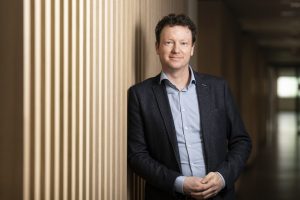The world is changing and universities should be changing with it. That is the basic idea behind the ECIU’s ambitious project, the ‘ECIU University’. It’s a joint university involving all ECIU members and offering a completely new type of education. Today, the ECIU Executive Board is at the University of Trento for further discussion about the ECIU University.
The ECIU University’s type of education is open to everyone, including lifelong learners, and that is not focused on getting a diploma, but on solving real life challenges. ‘I dream of a “NETFLIX” styled university, where you pay a fee and choose from all the courses available,’ says Sander Lotze, Manager of International Affairs at the University of Twente and the ‘ECIU University’ project leader.
Where and why did the idea for the ECIU University originate?
Lotze: ‘It originated in a board meeting held about a year ago in Kaunas. We were discussing the added value of enhanced collaboration and the future of education. We can see that there is an increased need for flexibility among students and an increased need for lifelong learning. Moreover, industry is asking for different skill sets than universities are currently delivering in their graduates. Society in general is dealing with larger and larger challenges. The generation of now is worrying about the problems of tomorrow. All in all, the world is changing. We asked ourselves: How can we react to it? And the typical ECIU answer is based on innovation and a close collaboration with regions and industry. We organized workshops with our stakeholders at every member university. Together we co-created the idea for the future of education and ended up with the plan for a challenge based ECIU University.’

What is a ‘challenge-based’ university?
‘It is focused on getting solutions to big societal challenges. We are talking about challenge based learning, research and innovation. We’d like to create an arena where people can set up challenges, a sort of a database where anyone – students, members of industry, government or citizens – can sign up and form teams. These teams would therefore include a diverse group of people with different expertise and background, all working on one challenge. Because of this diversity, the participants would naturally have different learning needs. Our goal is to deliver modular education. We don’t want a “one size fits all” university, but an educational system based on building blocks that you put together yourself.’
Should this new type of education replace the current universities?
‘The vision is not to replace the traditional universities. This should be an “add on” that can move to spaces which traditional universities have troubles accessing. Such as lifelong learning, which is something that we still struggle to accommodate. We want to provide an environment where you go to help the world or a company to solve a real problem. That is a very different starting point from what we offer now. Now you know how your degree will look like. There is little freedom; in the ECIU are creating flexible learning pathways, learning that is mission driven. We also believe that this type of education could keep people bound to their home universities.’
When do you think this could become a reality?
‘This is still a pilot phase. However, we are working on a challenge based Master programme that could start in the next three years. Within this programme, you would still get a degree but not in a specific field. It would allow you to move freely from one ECIU university to another during your studies. In the long run, we would also love to have one European challenge based Master programme in a certain UN Sustainable Development Goal. If it comes to lifelong learners, the idea is to provide them with a competence passport, which – just like a regular passport – needs to be renewed after a certain amount of time. We believe this could already start in the next year. For the more distant future, you pick and choose you challenge. I dream of a university, where you are a life-long member of an educational environment, you contribute to solving relevant challenges and gain knowledge, skills and competences rather than a degree.’
ECIU university
To start the ‘ECIU University’, the consortium has applied for funding under the call of the DG Education, Sports and Cultures (DG EAC) for European Universities. The plan for the ECIU University has been co-created with industry, public organisations, society, academics, future and current students at stakeholder events all over Europe. All 13 ECIU members have been involved in establishing this new joint university. If funded, the ECIU University project will kick-off in November 2019. The first phase of the project will last for three years, during which the concept will be developed further.
Please read more about ECIU in our new ECIU Magazine.